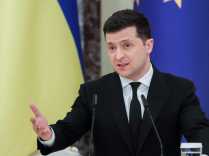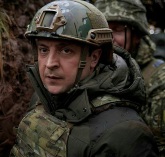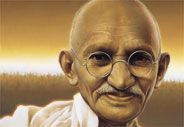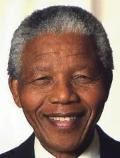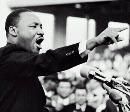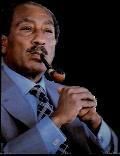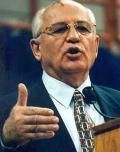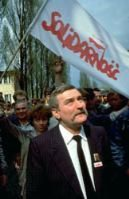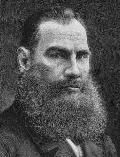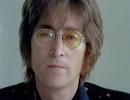
HISTORY OF PEACE
VOLODYMYR ZELENSKY
As Ukrainians fight for their freedom from Russian aggression and domination, Volodymyr Zelensky is courageously standing up for all democracies worldwide!
President Zelensky and all Ukraine’s heroism are highlighting the importance of many things we take for granted and redefining why freedom is worth fighting for. Freedom of speech, voting rights, free and fair elections (unlike Russia), rule of international law, and limiting propaganda and hate groups are among the critical protections from dictatorships.
MAHATMA GANDHI
During years of leadership and resistance against the British colonization of the Indian subcontinent, Mahatma Gandhi's beliefs never wavered on nonviolence. Gandhi's philosophy on nonviolence was
his trademark: "Nonviolence is the greatest force at the disposal of mankind. It is mightier than the mightiest weapon of destruction devised by the ingenuity of man." He stood firm in his beliefs on
nonviolent protest (i.e., passive resistance including hunger strikes) and religious tolerance. When Hindus and Muslims committed acts of violence, whether against the ruling British (or against each
other), he fasted until the fighting would cease. He was imprisoned many years for treason against the British Crown. Well-versed in yoga and meditation, he used his mind to not only endure, but
conquer his imprisonment. Starved for extensive periods of food, drink and human companionship, he learned to stay alive and not give in. The British, in a struggle to hold on to a valuable colony,
wanted him to publicly recant his beliefs in the cause of Indian freedom and cease his resistance efforts.
The British finally relented (in 1947), not to a military victory, but over-whelmingly to a triumph of the human will. Subsequently with independence, the countries of India and Pakistan were
born--with Gandhi emerging as a hero and father of a new Indian Nation.
thinkPEACE
NELSON MANDELA
Nelson Mandela spent most of his life as a prisoner of the government of White-apartheid South Africa for acts of sabotage and treason (the usual reaction of an occupier to dissent). He often gazed
at the ceiling of his cell and imagined tropical islands and women among the paint splotches and cracks. Such things occupied his mind and retained his sanity. Many hunger strikes and silent days
blended into a 30-year ordeal of imprisonment. Times changed and the overriding bloodbath of whites vs. blacks never occurred as cooler heads on both sides prevailed. Mandela was released in 1990 and
went on to assume the presidency of a new biracial republic. Mandela's accomplishment of reconciling whites and blacks in one of history's most cruelly divided nations is a phenomena of almost
miraculous success.
thinkPEACE
MARTIN LUTHUR KING
He was not a perfect man or a saint. But when he got behind the podium the World changed. Like Jesus, he brought the poor and disenfranchised the one thing they really needed--HOPE. We knew already
that what he said was true--everyone knew deep inside that all races and ethnicity's were equal in front of man and G-d. He taught us that to sustain racism was to deny our own intelligence, to deny
humanity itself. And yes, the government stalked him and called him a communist, but he was a man beyond political systems and the facades of society. The assassin's bullet could not quiet THE DREAM.
But with freedom comes a responsibility to improve society and stamp out hatred. If King were alive today, he would be concerned about our world. How the minorities fight the wars that only the rich
benefit from. How the last presidential election went down. The death of the middle class in America. I dreamed of Dr. King and saw tears in his eyes.....
thinkPEACE
MOHAMED ANWAR EL-SADAT
President of the Arab Republic of Egypt 1970-1981. Sadat was a man of great vision. He laid a foundation for peace in 1977 when he paid a historic visit to Jerusalem; paving the way for
Egyptian-Israeli negotiations which culminated in the Camp David framework for peace in the Middle East in 1978. This framework led to the 1979 Egyptian-Israeli peace treaty by the virtue of which
Israel withdrew from Sinai to begin the establishment of peace in the region. The two countries then established diplomatic relations in 1982.
Killed by an assassin's bullet, all can agree that the Middle East and the world need more great leaders like President Mohamed Anwar El- Sadat.
thinkPEACE
MIKHAIL GORBACHEV
In September 1978, Leonard Brezhnev, head of the Soviet Union, made a minor decision that would start a fundamental shift in the history of the world. Brezhnev's careful compromise in appointing
Mikhail Gorbachev to the governing Central Committee would eventually lead to the peaceful break-up of the Soviet Union, ending the Cold War. Gorbachev, unknown at the time, was very different from
his "old guard" peers on the Committee. Gorbachev was young, energetic, and an idealist.
The political structure of the Soviet Union was the result of the influence of Joseph Stalin. Stalin took the political system unleashed by the communist revolution of 1917 and turned it into a
killing machine built on a political system of socialist conformity. Stalin's firm hand suppressing the people surived his death. The brekup of the Soviet Union and the release of the Eastern Bloc
countries were inevitable--given the economic failure of the Soviet system in the 1970's and early 80's. The Soviets had fallen far behind the West in economic development.
Gorbachev had absolute power because he was the supreme leader of the Soviet Union and Communist Party. He had a great desire to reach the common people and have a dialogue with them. He realized that "Perestroika", the process of change, must be started from above--but the common people must be taught about democracy. Gorbachev went through towns and villages carrying his message of change. He promoted idealists like himself to the higher levels of government. One of these idealists was Boris Yelsin who went on to initiate Russia into democracy and lead the early Russian Republic.
Gorbachev guided the Soviet Union and the release of the Eastern Bloc countries through a bloodless transition from communism to democracy. This massive achievement qualifies Mikhail Gorbachev
as one of the greatest peacemakers of the 20th Century.
thinkPEACE
LECH WALESA
The efforts of Lech Walesa, leader of Polish Solidarity (the early union movement in communist Poland), culminated in the achievement of the "Gdansk Agreement" (ratified October 9, 1980) which
prepared the way for the Solidarity movement's legalization. Walesa accomplished this through leadership, organizational abilities and a series of "illegal" labor strikes. However, the following
December, the Solidarity movement was crushed by the communist Polish militia and Walesa (and others from the movement) were imprisoned.
By the tenth anniversity of the "Gdansk Agreement", Walesa was out of prison and communism in Poland was faltering (as well as in all of Eastern Europe and Russia). Walesa's primary biographer
tributes him as "an epochal figure, who shaped a country's struggle for sovereignty and freedom, played a central role in the collapse of communism and established the contours of his country's new
vibrant democracy and free market economy."
Lech Walesa achieved great goals through peaceful ideas.
thinkPEACE
LEO TOLSTOY
Author of the great novel War and Peace, Tolstoy is considered one of histories greatest thinkers on the issue of World Peace. He wrote many articles on the subject of peace--some involve
actual letters from soldiers seeking advice. His message to soldiers still rings true: "You are a soldier...you have been brought to 'pacify'...it has been instilled in you that you are not
responsible for the consequences of your shots. But you know that the man who falls bleeding from your shot is killed by you and by no one else..."
Tolstoy believed that "Armies will only be diminished and abolished when people cease to trust governments, and themselves seek salvation from the miseries that oppress them, and seek safety, not
by the complicated and delicate [efforts] of diplomats, but in the simple fulfillment of that law binding upon every man, inscribed in all religious teachings, and present in every heart, not to do
to others what you wish them not to do to you-above all not to slay your neighbors." (1896)
thinkPEACE
JOHN LENNON
He rests in Strawberry Fields,
A victim of a single madman,
Tied to a single bullet.
He said "give peace a chance,"
But they continued to fight,
And die.
He hated violence,
But in the end it consumed him,
Like the fire of lit match,
To the unwinds of a rope.
But he saw above the eyes of most men,
That war was a waste of time, lives,
And energy.
And an unsettling feeling,
That all war will end,
When the last human,
Takes his final breath...
El Pablo
HISTORIANS, THIS IS YOUR CHANCE!
Think of the progress mankind might make if there was no war!
The expence of war comes at a very steep price. The world looses not only big money which would be better spent on the elimination of hunger and disease around the world, but also people who might
have lived and become the next great inventor or peaceful leader.
Your historical data and help with this page would be much appreciated.
Please contact the thinkPEACE Network.
FOR MORE ABOUT PEACE HEROES:
VISIT THE NOBEL WEBSITE NOBEL PEACE PRIZE
